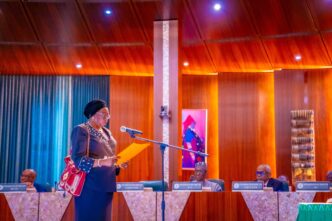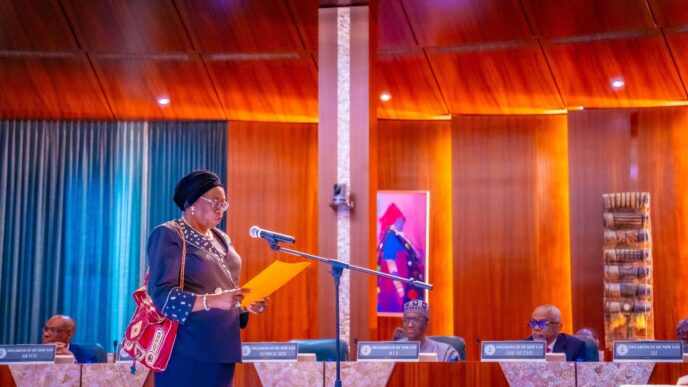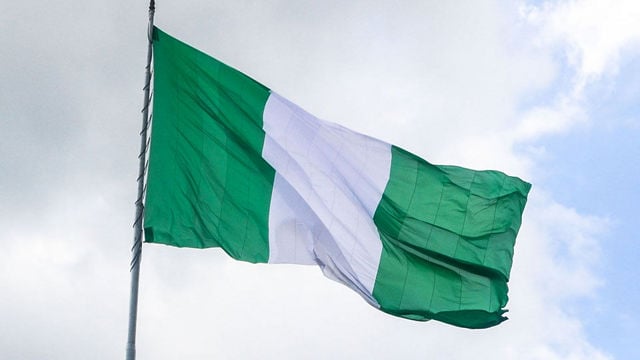BY VICTOR EMEJUIWE
There is no certainty about the president’s stand against corruption because, unlike past leaders who were able to situate their administration’s stand on corruption, President Bola Tinubu has yet to make any declaration concerning the fight against corruption. Going down memory lane, President Olusegun Obasanjo declared during his inauguration speech in 1999 his plan to stamp out corruption and ensure good governance. This was followed by several anti-corruption reforms he introduced which have been the bedrock of Nigeria’s anti-corruption fight.
In the same vein, when Umaru Musa Yar’adua succeeded Obasanjo in 2007, Nigerians knew him as one president with a hallmark of integrity and character who didn’t live to fulfil his desire to clean the country of corruption. Yar’adua first admitted that the process that brought him to power was faulty but promised zero tolerance for corruption. He went ahead to rejig the EFCC and ICPC to make them more effective in the fight against corruption.
President Goodluck Jonathan who took over from Yar’adua also made several promises to fight corruption and introduced systemic reforms that sought to prevent corruption at best. President Buhari was practically elected as Nigeria’s president in 2019 based on his anti-corruption posture. He also made pronouncements to rid Nigeria of corruption and was instrumental to so many reforms and commitments in the fight against corruption. One of his laudable commitments was the open government partnership, which made room for co-creative partnership between the government and the citizens, and another was the whistleblower policy.
Advertisement
The promises and plans of these past leaders may not have successfully taken Nigeria out of the cesspit of corruption but it provided a strategic path in the fight against corruption.
The success or failures of these past administrations in the fight against corruption also hinged on their level of commitment towards the implementation of the laws and policies they set up against corruption. However, it is worrisome that since the inauguration of President Bola Ahmed Tinubu, he has yet to make a bold statement in the fight against corruption.
Some may argue that making a statement against corruption is not as important as taking positive actions and implementing reforms to prevent corruption but in this part of the world, presidential statements set a tone for the re-shaping of attitudes, actions and policies. Such statements are easily given away as the body language of the leader. The impact of the presidential statement could be felt when President Tinubu announced during his inauguration on May 29th, 2023, that “subsidy is gone”.
Advertisement
That statement reshaped the current economic atmosphere of the nation. A presidential statement against corruption would send different signals to all segments of society, especially heads of agencies, parastatals and ministries. It would also inform the activities of the various anti-corruption agencies to work in line with the presidential directives.
The essence of this article is for Tinubu to provide clarity on his stand in the fight against corruption in Nigeria and clear the air concerning the negative impression Nigerians have about the alleged ongoing large-scale corruption in his government. It would serve as a measure to define the principles of Mr President when it comes to corruption in government. A stand by Mr President against corruption would herald the effective implementation of ongoing anti-corruption policies set up by past administrations.
On the open government partnership, not much has been achieved in the national implementation plan NAP (II) and Nigeria just signed on to the 2023-2028 (NAP (III). The president’s commitment to the fight against corruption would therefore fortify government actors’ partnership with the non-state actors more effectively and this would lead to the actualisation of the OGP.
A statement from Tinubu against corruption would send a strong signal to the international community that Nigeria is committed to the ideals of a more accountable and transparent government that would boost the confidence of foreign investors. The silence of Mr President on the subject of corruption is a threat to the management of public funds in the hands of public officers.
Advertisement
There are few mentions of strategies put in place by the current administration to fight corruption. Much more has been done to generate revenue for the government but little of what is done to prevent revenue leakages is being heard. The presidential statement against corruption should be followed by the implementation of anti-corruption reforms that would serve as a permanent strategy to curb all forms of corruption in the MDAs.
The statement should be backed by the commitments of Mr President and all state actors to both implement existing reforms and introduce new reforms that would nip corruption in the bud in Nigeria.
Victor Emejuiwe, the monitoring evaluation/strategic communication manager Centre for Social Justice, can be reached via [email protected]
Advertisement
Views expressed by contributors are strictly personal and not of TheCable.








